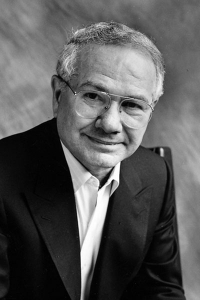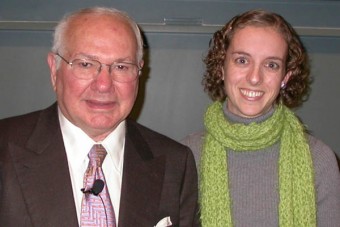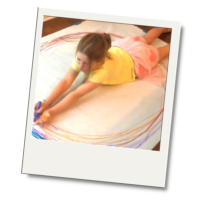 “The prime value of the arts in education lies, from my point of view, in the unique contributions it makes to the individual’s experience with and understanding of the world. The visual arts deal with an aspect of human consciousness that no other field touches on: the aesthetic contemplation of visual form.”
“The prime value of the arts in education lies, from my point of view, in the unique contributions it makes to the individual’s experience with and understanding of the world. The visual arts deal with an aspect of human consciousness that no other field touches on: the aesthetic contemplation of visual form.”
– Elliot Eisner, Educating Artistic Vision (1972)
Today I learned that Elliot Eisner, one of the great heroes and thought leaders in the world of arts education has passed on. I knew him not only as a brilliant scholar and influential advocate for arts education, but also as a gracious soul. His contributions to the field of arts education run deep and wide, as he’s influenced countless art teachers and educators (including me) who carry on his life’s work. Eisner was the Lee Jacks Professor Emeritus of Education at the Stanford Graduate School of Education and Professor Emeritus of Art. He was the leading theorist in arts education and champion of learning in the arts. He wrote extensively on the subject and became a leading voice for the Getty Museum’s Discipline-based Arts Education Curriculum. As a middle school art teacher, this was my first introduction to Eisner’s work, and I had no idea how influential he would be in my life.

Early in my career as an arts educator I read many articles and books by Professor Eisner. His eloquent words resonated with me and affirmed that this was a field that I could dive into deeply and make a difference in. I went on to graduate school at Harvard and learned that Professor Eisner was scheduled to speak in one of my classes. I couldn’t believe my luck!
A couple years later when I took on a job as an art museum educator in California, I reached out to Professor Eisner. He was unusually gracious and invited me to meet with him for lunch. We soon struck up a friendship and met frequently to talk about a book he was working on. Amidst the “business” of our conversations, he challenged me to think more deeply about the importance of arts education through a philosophical lens that varied so greatly from my natural tendency towards hands-on making.
He enjoyed pushing me to defend my ideas and never allowed me get away with a pat response. I had to choose my words carefully, as he did, and think hard about how my actions defended my beliefs. I loved these afternoons with Elliot where I took copious notes and fretted over holding myself together in the presence of such a distinguished scholar and kind soul.
Not too long ago, I asked Elliot if he would share his 10 Lessons the Arts Teach in my forthcoming book. I waited on pins and needles, and by some stroke of luck he agreed! By including this in my book, I hope to help spread his enduring words to new generations of parents and teachers who are in the business of raising creative children. Here’s the full text for your reading pleasure. If you’d like to help spread this message, I’d encourage you to pin this image and/or pass it along to a friend. I’ve known many teachers over the years who have this text hanging in their classrooms as a reminder of the importance of an arts-rich education.
Ten Lessons the Arts Teach

Carrying on the work of Elliot W. Eisner
As I reflect on my brief encounters with Elliot, I think about how we can each carry on the urgency of his life’s work. What would Elliot want? I really don’t know. But an advocate for the arts and learning through the arts, I can only imagine that he would be thrilled to see:
- Teachers who put children at the center of learning
- Arts curriculum that is includes problem solving, aesthetic reasoning, and critical thinking
- Parents who advocate for arts education
- People who live life more fully with art in their homes and lives
If you’ve also been touched by Elliot Eisner’s work or life, I’d love to hear from you. And if you’d like to make a contribution in his honor, his family requests donations to the National Art Education Association‘s Elliot Eisner Lifetime Achievement Award, established by the Eisners to recognize individuals in art education whose career contributions have benefited the field. The address for the NAEA is: 1806 Robert Fulton Drive, Suite 300, Reston, Virginia 20191.
Articles and Talks by Elliot W. Eisner (all PDF’s):
What do Children Learn when they Paint? The Arts and the Creation of Mind (first chapter of this book)
What Can Education Learn from the Arts about the Practice of Education?, International Journal of Education and the Arts
The Kind of Schools we Need, Phi Delta Kappan
Art in Mind: An Agenda for Research
Multiple Intelligences: Its Tensions and Possibilities




I had no idea of his passing. I was lucky enough to be his student at Stanford where he was a great supporter of my work in early childhood education in a school without much time for little ones (then). Amazing man – thank you for sharing your tribute!
[…] https://tinkerlab.com/elliot-eisner-arts-education-leader-visionary/ […]
He was the leading theorist in arts education and champion of learning in the arts